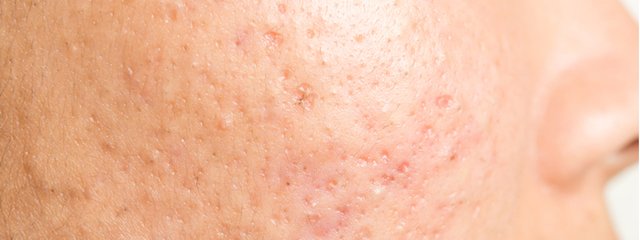
Although acne is usually a temporary problem, the scars it leaves can be permanent. As unwelcome and unsightly as they may be, scars are a part of your skin's normal healing process. Most superficial wounds will heal without a scar, but when the dermis - the second and thickest layer of skin - is damaged, you'll see some scarring. Find out what causes unsightly acne scars and how you can prevent them.
What Causes Acne Scars?
Acne scars are usually the result of an inflamed lesion such as a pustule, papule, or cyst. These inflamed blemishes or pimples occur when a pore becomes clogged by the perfect storm of excess sebum, dead skin cells, oil, and bacteria. The pore swells and the follicle wall breaks. If this happens near the skin's surface, it causes a minor lesion that usually does not leave a scar.
More serious lesions occur when there is a break deep within the follicle wall. In these instances, the infected material leaks out into the dermis and destroys the healthy skin tissue. To repair this damage, the skin forms new collagen fibers. Made out of protein, collagen gives the skin strength and flexibility. However, just like when you patch up a wall, the finished skin repair usually doesn't look as smooth and flawless as it did before the injury.
Inflammation is the main cause of pimple scars. The more the skin is inflamed, the more likely there will be a scar. Whiteheads, blackheads, and non-inflamed blemishes usually don't cause scarring, since they don't injure the skin.
Types of Acne Scars
As the skin heals, sometimes the body produces too much collagen. This causes an overgrowth of tissue on the surface of the skin. These masses are called keloid, or hypertrophic, scarring. However, atrophic or depressed acne scars are more common. Atrophic scars occur when there is tissue loss. Boxcar and ice pick scars are two common types of atrophic acne scars.
Sometimes what initially seems like an acne scar isn't really a scar, but is post-inflammatory hyperpigmentation. This is a temporary skin discoloration that will eventually fade. Medications such as Retin-A can speed the time it takes for the skin discoloration to fade.
Can Acne Scars Be Prevented?
Although some acne scars cannot be completely prevented, the chances of them forming can be minimized. The best way to reduce acne scarring is to get acne under control as quickly as possible. Start treating it right away and see a dermatologist if it doesn't improve with over-the-counter acne treatments. Treating acne quickly lessens breakouts and prevents acne from becoming severs. By preventing pimples you can prevent scarring.
Inflammation and Pimples
Large, inflamed pimples are more likely to scar than non-inflamed breakouts, whiteheads, and blackheads. The first line of defense should always be to reduce inflammation and avoid doing anything that will irritate the skin, including aggressive scrubbing and harsh skin care products.
Pimple Popping
Although a popular phenomenon, pimple popping should be avoided. While popping blackheads may be necessary, pimple popping can force debris deeper into the dermis and spread infection and worsen inflammation. In addition, popping pimples can increase their healing time and increase the likelihood of scarring. If absolutely necessary, visit your dermatologist who can pop them safely.
Squeezing Pimples
Squeezing a pimple is always a bad idea. Although pimples trap acne bacteria inside the pores, the blemish is caused by your immune system's response to the trapped bacteria - inflammation - and this destroys not just the bacteria but the skin cells around it. Squeezing the pimple does not get rid of all the bacteria, and new skin grows over the bacteria. It then cannot be reached by topical antibacterial products and the immune system continues to try to get rid of the bacteria by increasing inflammation.
Cyst Popping
Acne cysts are filled with fluid and can resolve on their own. These large cystic pimples are usually caused by hormones. Incorrect cyst popping can put you at risk of soft tissue infections, so they should never be popped at home. Even if they are driving your crazy, your best bet is to leave them alone, because anything you do will probably make them worse.
Can You Treat Acne Scars?
As hard as you try, you may not be able to avoid developing some acne scars. However, there are acne treatments available that can minimize the appearance of these scars. Before getting treatment, it is important to clear up your acne. New breakouts can cause new scars and the inflammation caused by pimples can reduce the effectiveness of the treatment for scars.
As we age, acne scars often become more noticeable. Treatments include chemical peels, minor skin surgeries, and laser treatments. There is no single solution for every acne scar. Differences in depth, location, and number all affect treatment. The key to treating acne scars is selecting the proper method for each type of scar.